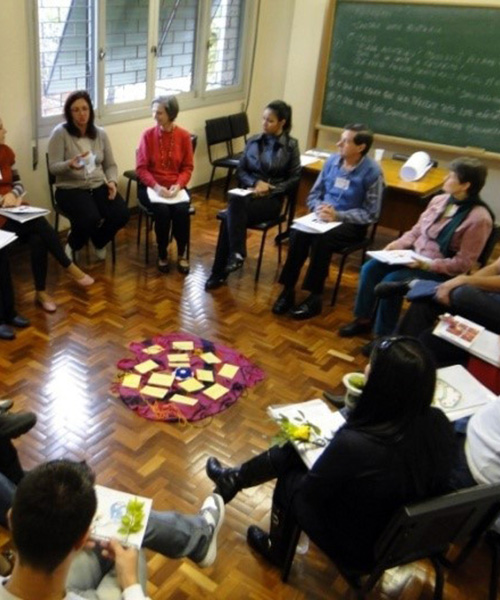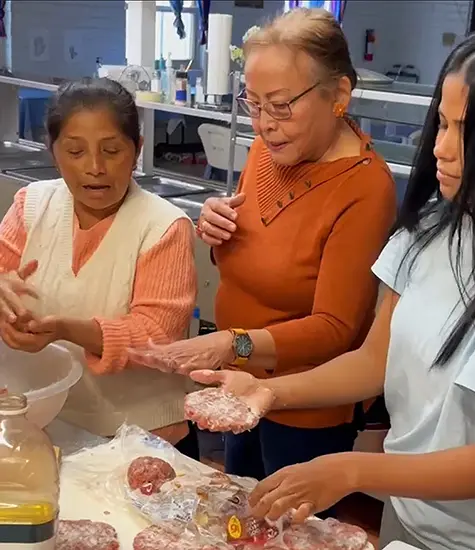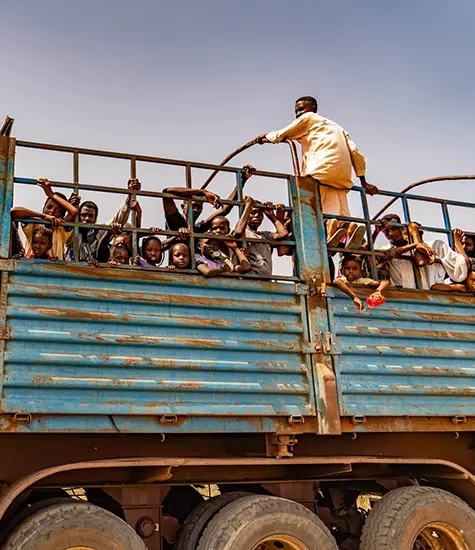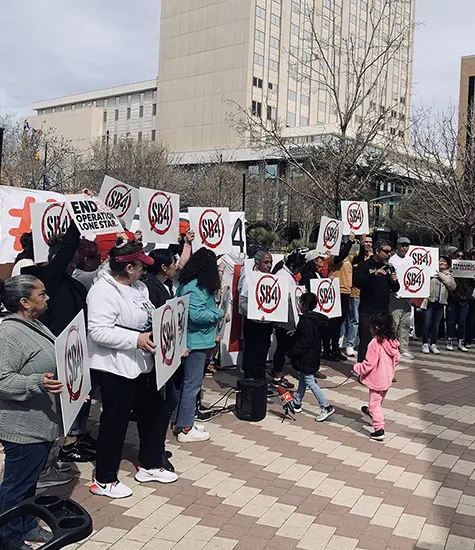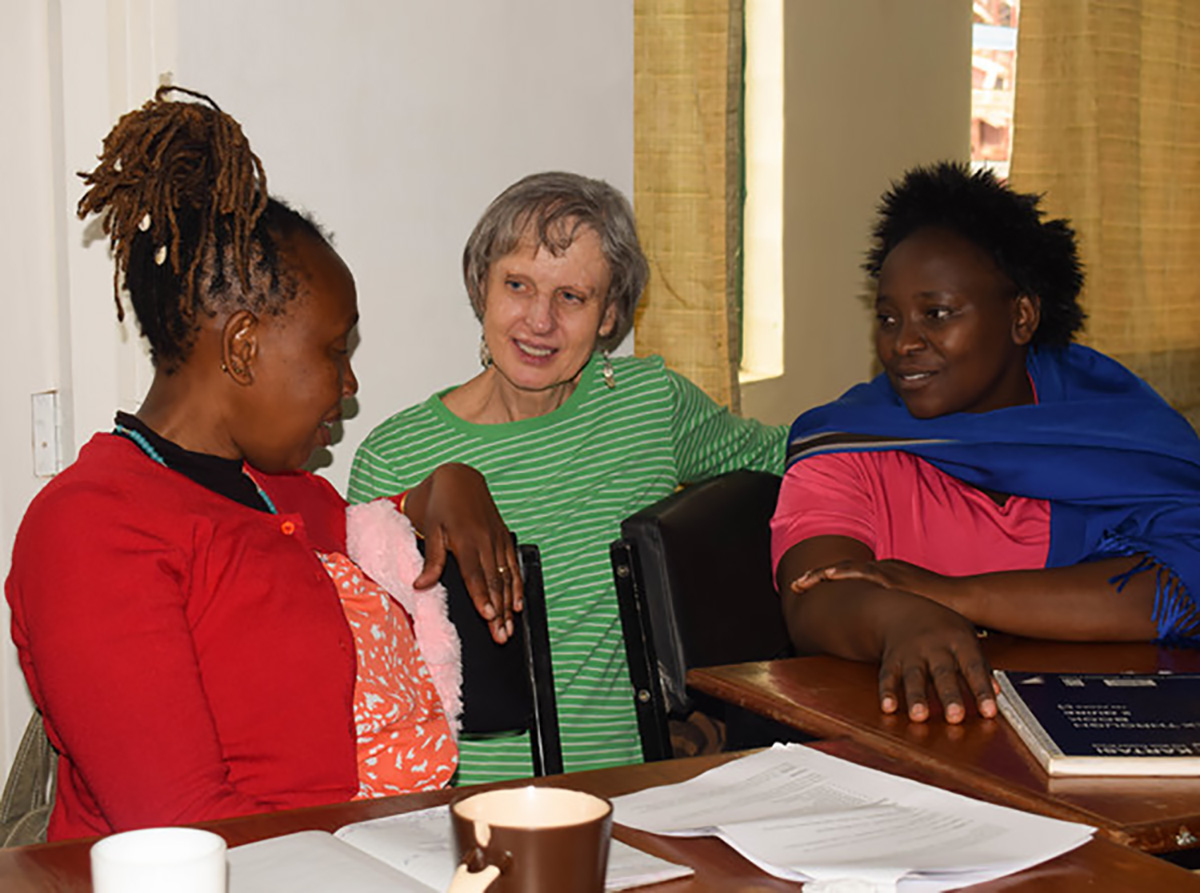
Joanne (center) with two course members
Joanne (center) with two course members.
By Julie Bourbon
Joanne Blaney realized a long time ago that justice sometimes has nothing to do with the judicial system. But this has not turned out to be a handicap in her work. In fact, as a Maryknoll lay missioner who works with victims and perpetrators of violence in São Paolo, Brazil, quite the opposite is true.
“We work toward helping people feel, first of all, restored to yourself, that you are a person of dignity and respect,” said Joanne of the process of restorative justice. Then, she said, they try to restore broken relationships and work for “a just justice for everyone involved in the conflict or crime.”
Since joining Maryknoll in 1990, except for a few odd years back in the States, Joanne has worked at a human rights center in an impoverished, violent neighborhood of São Paolo, engaging with individuals and community leaders of marginalized and vulnerable populations to break cycles of urban and domestic violence. She uses restorative justice principles, including dialogue and compassion, as well as working to change structures, to accomplish that goal.
This brings her into relationship with people experiencing conflict within their families or communities, and into prisons where she teaches these same principles to offenders. “There is a process of healing that takes place,” Joanne said, “that leads to responsibility for the harm they have caused and a desire to repair the harm with the victim and/or their family.
It is, she said, a way for people to transform their concept of justice, when before they wouldn’t even have thought that a real justice could be part of their lives.
“We’ve had cases working with victims and offenders where the victim says, ‘I want that person to suffer more than I’ve suffered and I will not forgive them,’” she said. “As you go through a restorative justice process, they are able to listen to the other person’s story and to see the other as a human being instead of a monster.” There is healing and forgiveness that helps victims, as well as offenders, to move forward with their lives.
Living Out Gospel Principles
With her background as a Sister of St. Joseph of Chestnut Hill in Philadelphia and an educator, there was never any doubt that Joanne would spend her life advancing the cause of social justice. But she didn’t necessarily see a future for herself as a missionary.
“I’ve just always been concerned in my life with how we translate the Gospel into people’s reality and people’s lives,” she said.
Growing up in a poor, immigrant neighborhood in Philadelphia called Kensington, Joanne was the third of 12 children of a devoutly Catholic Irish family. All of the children attended the parish school, and her parents were very involved in neighborhood activities through the parish.
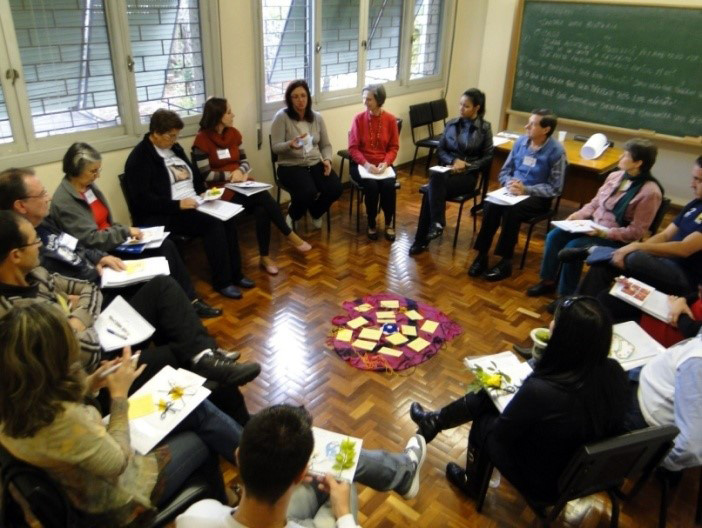
Joanne leading a Restorative Justice Circle
“My parents always looked at other people with great dignity and respect, that we are all children of God, we are all equal,” Joanne remembered. “Mostly, my parents influenced all of us in trying to live out Gospel principles.”
They probably weren’t surprised, then, when Joanne entered religious life at 17. She remained a sister for 13 years and spent much of that time as a teacher and then principal in urban schools in Washington, D.C. She recalled that by the 1980s, crack cocaine was gripping the city; many of her students were being raised by their grandmothers, who were remarkable examples of dedicated service, she said.
Even after she left the order, she continued as a principal in D.C.’s Catholic elementary schools and started volunteering with a group of Carmelite Sisters on the weekends. The Carmelites were ministering to women fleeing the wars in Nicaragua and Guatemala, and Joanne found herself increasingly interested in global justice issues.
When a Maryknoll priest from the Philippines visited her school to address the students, Joanne stopped by the room to listen for a minute. Instead, she found herself transfixed. Immediately, she felt the call to follow the Gospel beyond the borders of the United States.
“It just seemed that was the next step,” she said.
A Lifetime’s Work
Joanne has given courses and presentations on restorative justice as a Maryknoll missioner throughout the world, including Kenya, Australia, Rwanda, Finland, and Northern Ireland. She is both a facilitator and trainer of facilitators, and considers herself fortunate to truly love her work.
“It’s hard and difficult to see so much, but marvelous trying to see the world differently from different perspectives,” she said of the many people she’s met and places she’s traveled to since becoming a lay missioner. “In spite of all the problems in our world, I am hopeful because of the many dedicated people whom I have met and who are doing such wonderful work.”
Marj Humphrey, director of missions for Maryknoll, has known Joanne for more than 20 years and admires her passion and dedication.
“Joanne is unable to separate who she is from her very core, from her faith,” said Marj. “Her deep faith motivates and sustains her in her life. She is tireless in her commitment to mission and has been for decades.”
Reflecting on her life in Maryknoll, Joanne feels that she is exactly where she is meant to be.
“I’ve struggled with how to live Gospel values in a world torn apart by poverty and injustice,” she said. “This is what I want to do with my life, because I believe that mission and following the Gospel is about bringing people together and dialoguing so that we can truly build peace and bring about justice.”
Living as a Maryknoll missioner has allowed Joanne to become an instrument of God’s desire to heal communities.
“The Gospel is a liberating force,” she said, “that fosters human dignity, connects hearts and builds peace.”
Joanne recommends the following resources for those interested in learning more about restorative justice principles and practices:
Books:
Howard Zehr, Changing Lenses: Restorative Justice for our Times. Scottsdale, Pennsylvania: Herald Press, 2015.
Kay Pranis, The Little Book of Circle Processes: A New/Old Approach to Peacemaking (The Little Books of Justice and Peacebuilding Series). Good Books. 2005.
Arthur Paul Boers, Justice That Heals: A Biblical Vision for Victims and Offenders. Newton: Faith and Life Press. 1992.
A Companion, Peace and Justice Shall Embrace: Toward Restorative Justice, a Prisoner’s Perspective. Writers Club Press. 2001.
Websites:
www.zehr-institute.org/# (Articles by Howard Zehr and John Paul Lederach)
www.restorativejustice.org Centre for Justice & Reconciliation
https://catholicsmobilizing.org/restorative-justice Catholic Mobilizing Network
Julie Bourbon is the editor of ENCOUNTER.
Originally published in the April 2019 issue of ENCOUNTER, the newsletter for the United States Catholic Mission Association (www.uscatholicmission.org). Reprinted with permission.

